Villa Aurora Events Archive
November 2021
Ceremony - The Sanctuary. Art and Literature from Exile and Hermitage
Los Angeles (520 Paseo Miramar, LA, CA 90272)

Information
Marianne Heuwagen, Deputy Chairwoman Villa Aurora & Thomas Mann House
Stefan Schneider, Consul General of the Federal Republic of Germany
Marje Schuetze-Coburn, Associate Dean USC Feuchtwanger Memorial Library, Faculty Affairs; Dean of Research, Co-Head, East Asian Library
Steven D. Lavine, President Emeritus CalArts, Chairman Thomas Mann House Advisory Board
3:15 pm The Sanctuary: Session 1
Stefan Keppler-Tasaki: 25 Years of Literature from the Villa Aurora, a Sanctuary of Exile and a Gateway to California
Q&A moderated by Michaela Ullmann
Reading by Kevin Vennemann: Sunset Boulevard: Vom Filmen, Bauen und Sterben in Los Angeles
Q&A moderated by Stefan Keppler-Tasaki
4:30 pm coffee break
5:00 pm: Introduction of current Villa Aurora artists-in-residence Ulu Braun (film), Anna Sofie Hartmann (film), Sarah Szczesny (visual art), and Isabelle Stever (film)
5:15 pm: Hanno Leichtmann (Villa Aurora composer-in-residence 2018): OUTERLANDS, live performance of a composition made exclusively with sounds recorded inside the Villa Aurora cinema organ and a 4-channel backing tape
Participants
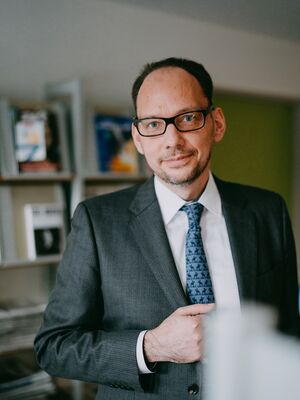
Stefan Keppler-Tasaki, born 1973 in Wertheim am Main, studied German Literature at the Julius Maximilian’s University Würzburg and received his doctorate in 2005 on the topic of “Limits of the Self” in Goethe's narrative fiction. From 2002 to 2008, he was an Assistant Professor at the University of Würzburg and the Free University of Berlin, subsequently Junior Professor at the Friedrich Schlegel Graduate School of the FU. In 2012, he was appointed to a tenure-track professorship for Modern German Literature at the University of Tokyo and has lived in the Japanese capital since then.
His work focuses on Goethe and on exile writers (Alfred Döblin, Thomas Mann, etc.), especially from the angle of the history of ideas and of inter-media studies. Also, he repeatedly occupied himself with the history of NS ideology, not least in his region of origin in the southwest of Germany.
During his student and doctorate years, Stefan was a scholarship holder of the German Academic Scholarship Foundation. From 2015 onwards, the Einstein Foundation Berlin supported his research cooperation between the Free University of Berlin and the University of Tokyo through a five-year Einstein Visiting Fellowship. In 2019, he was also a fellow at the Thomas Mann House in Los Angeles. He is a member of the Berlin based Cluster of Excellence "Temporal Communities – Doing Literature in a Global Perspective".
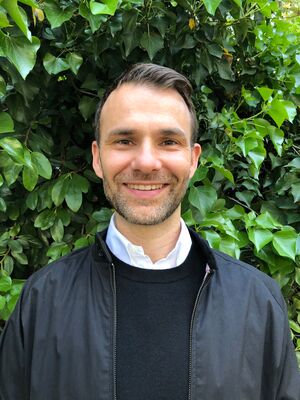
Kevin Vennemann teaches at Scripps College in Claremont, CA, and lives in Los Angeles. Recent publications include the study Die Welt vom Rücken des Kranichs. Thermodynamik und der Verfall einer Familie (Berlin: Matthes & Seitz 2020).

Hanno Leichtmann got his start in improvised music, but has focused on electronic music since 1998. With his solo project “Static”, he released several albums and toured the world. In 2011, Leichtmann released the “lost” Soundtrack for Christoph Schlingensief’s last film "African Twintowers" (zuletzt aufgeführt bei der CTM 2016 im HAU 1). As a member of the trio “Groupshow”, he has set to music the eight hour long Andy Warhol “Empire” on several different occasions. Since 2008, he has regularly curated festivals and club series, such as Letra / Tone – Festival for graphic arts and music and SYN / CUSSION - Festival for percussion and electronics. Since 2013, Leichtmann has worked primarily as a sound artist, using sound archives as sounds set for new works. His extensive work “Nouvelles Aventures” was presented during the International Summer School for New Music. Leichtmann’s percussive sound installation “Skin, Wood, Traps”, created during a residency in Wellington, New Zealand, was presented at the House of World Cultures in Berlin. During his 2018 residency at Villa Aurora, he developed a six-channel sound installation for dance company Sasha Waltz & Guests which premiered in Berlin that same year. (Im März 2019 kuratierte er die zweite Ausgabe des Letra / Tone Festivals für Grafik und Musik). Leichtmann is co-curator, with Caroline Brandl, of the festival SCULPTURE – Sculptural Concepts for Choreography and Music (welches zweimal im Georg Kolbe Museum in berlin stattfand). In October 2021, Leichtmann presented his sound installation SECULUM at the Donaueschinger Musiktage. In 2021, he also founded an exclusive fashion label (in Ponta do Sol, Madeira) which is distributed at the legendary boutique Nova Minerva in Madeira’s capital Funchal.
Hanno Leichtmann lives and works in Berlin and Ponta do Sol, Madeira.
Partners
In cooperation with USC Libraries, USC Max Kade Institute, Freie Universität Berlin and University of Tokyo
Hinweise zur Veranstaltung
Symposium - The Sanctuary. Art and Literature from Exile and Hermitage, Nov. 10
Online

Information
Session 2: November 10, 2021, 9:00am
Welcoming Remarks by Claudia Gordon (Villa Aurora) and Michaela Ullmann (USC Feuchtwanger Memorial Library)
Introduction to the Zoom Meeting Series by Claudia Gordon and Stefan Keppler-Tasaki
Reading by Tanja Dückers: Safe.Space
Q&A moderated by Stefan Keppler-Tasaki
Session 3: November 15, 2021, 10am
Reading by Felicitas Hoppe: The Sanctuary
Q&A moderated by Friedel Schmoranzer
Session 4: November 16, 2021, 10:30am
Lecture by Annette Jael Lehmann-Kolesch: From the Secret Wing: On the Move - Multidirections of Doing Literature
Q&A moderated by Friederike von Schwerin-High
Participants

Stefan Keppler-Tasaki, born 1973 in Wertheim am Main, studied German Literature at the Julius Maximilian’s University Würzburg and received his doctorate in 2005 on the topic of “Limits of the Self” in Goethe's narrative fiction. From 2002 to 2008, he was an Assistant Professor at the University of Würzburg and the Free University of Berlin, subsequently Junior Professor at the Friedrich Schlegel Graduate School of the FU. In 2012, he was appointed to a tenure-track professorship for Modern German Literature at the University of Tokyo and has lived in the Japanese capital since then.
His work focuses on Goethe and on exile writers (Alfred Döblin, Thomas Mann, etc.), especially from the angle of the history of ideas and of inter-media studies. Also, he repeatedly occupied himself with the history of NS ideology, not least in his region of origin in the southwest of Germany.
During his student and doctorate years, Stefan was a scholarship holder of the German Academic Scholarship Foundation. From 2015 onwards, the Einstein Foundation Berlin supported his research cooperation between the Free University of Berlin and the University of Tokyo through a five-year Einstein Visiting Fellowship. In 2019, he was also a fellow at the Thomas Mann House in Los Angeles. He is a member of the Berlin based Cluster of Excellence "Temporal Communities – Doing Literature in a Global Perspective".

Kevin Vennemann teaches at Scripps College in Claremont, CA, and lives in Los Angeles. Recent publications include the study Die Welt vom Rücken des Kranichs. Thermodynamik und der Verfall einer Familie (Berlin: Matthes & Seitz 2020).

Tanja Dückers, born in 1968 in Berlin (west), is an author and publicist. She published 19 books; among her most important works are the novel “Spielzone,” “Himmelskörper,” “Der Längste Tag des Jahres” und “Hausers Zimmer,” the essay collection “Morgen nach Utopia,” the plays “Spielzone” and “Grüße aus Transnistrien” (world premiere at Berlin’s HAU II) as well as her volumes of poetry, among other “Fundbüro und Verstecke.” Most recently, her autobiographically tinted retrospect “Mein altes West-Berlin” as well as “Schoki Doki” (short stories) were published.
Collaboration with artists of various disciplines, composers, theater directors, painters, chocolatiers.
Tanja Dückers nationally and internationally expresses her opinion on topics of cultural and socio-political relevance, she writes for various newspapers, magazines, TV and radio stations (Deutsche Welle, Tagesspiegel, ZEIT Online, Morgenpost, Berliner Zeitung, Süddeutsche, taz, Frankfurter Rundschau, Welt, Jungle World, Politik & Kultur, kulturaustausch, AI-Journal, RBB). She is part of Deutschlandfunks “Politisches Feuilleton” on a regular basis.
Tanja Dückers won numerous prizes and scholarships which brought her to New Hampshire (Dartmouth College), Pennsylvania (Allegheny College), Ohio (Miami University as well as Oberlin College), California (Villa Aurora), South Africa and to many other mostly middle and eastern European countries. She held writing workshops in Germany and internationally, for example in Romania, Belarus, Kenya and India. In 2022, she will be Max Kade fellow at the University of Wisconsin-Madison.
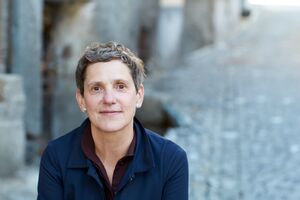
Berlin-based writer Felicitas Hoppe was born in Hameln in 1960.
Her debut “Picknick der Friseure” was published in 1996, her novel “Pigafetta” followed in 1999 after taking a world trip on a freight ship, in 2003 “Paradiese, Übersee” was published, in 2004 “Verbrecher und Versager,” in 2006 “Johanna,” in 2009 “Iwein Löwenritter,” in 2009 “Sieben Schätze” and the story “Der beste Platz der Welt,” in 2010 “Abenteuer – was ist das?” in 2011 “Grünes Ei mit Speck,” a translation of texts of the American children’s writer Dr. Seuss, in 2012 the novel “Hoppe,” in 2018 the novel “Prawda. Eine amerikanische Reise” and, most recently in 2021, “Die Nibelungen. Ein deutscher Stummfilm.” She has been awarded numerous prizes, amongst others the aspekte-Literaturpreis, the Bremer Literaturpreis, the Roswitha-Preis der Stadt Bad Gandersheim, the Rattenfänger-Literaturpreis, the Georg-Büchner-Preis and the Erich Kästner Preis für Literatur. Felicitas Hoppe is the first winner of the Große Preis des Deutschen Literaturfonds. She furthermore held poetics lecturing posts and was visiting professor in Wiesbaden, Mainz, Augsburg, Göttingen, at Dartmouth College in Hanover, New Hampshire, at Georgetown University, Washington D.C., in Hamburg, Heidelberg and Cologne.
Literary prizes (selected):
Foglio-Preis für junge Literatur (1995)
Aspekte-Literaturpreis (1996)
Ernst-Willner-Preis im Bachmann-Literaturwettbewerb (1996)
Rauriser Literaturpreis (1997)
Laurenz-Haus-Stiftung Basel (1998)
Niedersächsischer Förderpreis für Literatur (1999)
Spycher: Literaturpreis Leuk, Nicolas Born-Preis, Heimito von Doderer-Literaturpreis (alle 2004)
Brüder Grimm-Preis der Stadt Hanau (2005)
Bremer Literaturpreis (2007)
Roswitha-Preis der Stadt Bad Gandersheim (2007)
Rattenfänger-Literaturpreis (2010)
Preisträgerin des Comburg-Stipendiums (2010)
Villa Aurora (2012)
Georg-Büchner-Preis (2012)
Werner-Bergengruen-Preis (2015)
Erich Kästner Preis für Literatur (2015)
Ehrendoktorwürde der Leuphana Universität Lüneburg (2016)
Großer Preis des Deutschen Literaturfonds (2020)
Kasseler Literaturpreis für grotesken Humor (2021)
http://www.felicitas-hoppe.de/
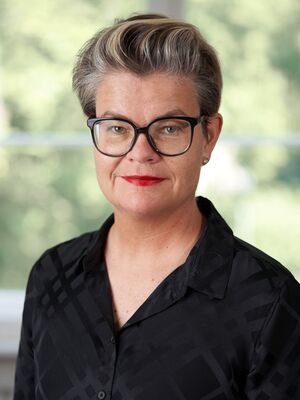
Annette Jael Lehmann-Kolesch has studied Comparative Literature, Art History, American Studies and Philosophy in Berlin, Oxford and Berkeley. In 1996, she received her PhD in comparative literature and aesthetics at the Freie Universität Berlin. Between 1995–1998,she was Visiting Assistant Professor at the Humanities Division of the University of California (UCLA), Adjunct Faculty Member at the School of Critical Studies, California Institutes of the Arts (CalArts), and Visiting Scholar at the School of Arts, Letters and Sciences at the University of Southern California (USC).Between 1999–2005, she was Research Assistant at the DFG-Collaborative Research Centre SFB 447: Kulturen des Performativen and obtained her Habilitation in Visual Culture at the Freie Universität Berlin (2005). During this time, she was also Executive Manager of the Zentrum für Interdisziplinäre Kunstwissenschaften und Ästhetik (2006). Between 2007–2019, she was Professor of Contemporary Art, Visual Culture and Theater at the Freie UniversitätBerlin. Since 2017, she is Principal Investigator (PI) at the Einstein Center Digital Future (ECDF). In 2019 she became Principal Researcher (PR) at the Excellence Cluster ‘Temporal Communities: Doing Literature in a Global Perspective’ at the Freie Universität Berlin and PI at the Friedrich Schlegel Graduierten Schule für Literaturwissenschaftliche Studien. Since fall 2019/20, she has been Professor and Head of the Seminar für Kultur-und Medienmanagementat Institut für Theaterwissenschaft, FU Berlin. She is an affiliate at metaLAB(at) Harvard/Berkman Klein Center, Harvard University. Since spring 2021 she is head of metaLAB (at) FU Berlin. Annette Jael Lehmann-Kolesch is married, has two children and lives in Berlin.
HONORS /AWARDS /FELLOWSHIPS
Fellowship, Literary Research Center Huntington Library, Pasadena, California, USA (1997)
Visiting Research Fellow, Getty Research Institute, Los Angeles, USA (2001)
Prize winner (1st place) of theJungen Akademie at the Berlin-Brandenburgischen Akademie der Wissenschaften and the Deutschen Akademie der Naturforscher Leopoldina, Deutschland (2003)
Visiting Fellow at Rothermere American Institute, University of Oxford, England (2004)
Mentee, ProFiL-Programm, Mentoring, Training, Networking, Freie Universität Berlin, Technische Universität Berlin, Humboldt Universität Berlin, Universität Potsdam, Germany; mentor: Prof. Monika Grütters (2005)
Senior Research and Teaching Stay at the Hebrew University ofJerusalem, Israel (2015)
Global Humanities Senior Fellow at Mahindra Humanities Center at Harvard University, Cambridge, Massachusetts, USA (2016/17
Partners
In cooperation with USC Libraries, USC Max Kade Institute, Freie Universität Berlin and University of Tokyo.
Symposium - The Sanctuary. Art and Literature from Exile and Hermitage, Nov. 15
Online

Information
Session 2: November 10, 2021, 9:00am
Welcoming Remarks by Claudia Gordon (Villa Aurora) and Michaela Ullmann (USC Feuchtwanger Memorial Library)
Introduction to the Zoom Meeting Series by Claudia Gordon and Stefan Keppler-Tasaki
Reading by Tanja Dückers: Safe.Space
Q&A moderated by Stefan Keppler-Tasaki
Session 3: November 15, 2021, 10am
Reading by Felicitas Hoppe: The Sanctuary
Q&A moderated by Friedel Schmoranzer
Session 4: November 16, 2021, 10:30am
Lecture by Annette Jael Lehmann-Kolesch: From the Secret Wing: On the Move - Multidirections of Doing Literature
Q&A moderated by Friederike von Schwerin-High
Participants

Stefan Keppler-Tasaki, born 1973 in Wertheim am Main, studied German Literature at the Julius Maximilian’s University Würzburg and received his doctorate in 2005 on the topic of “Limits of the Self” in Goethe's narrative fiction. From 2002 to 2008, he was an Assistant Professor at the University of Würzburg and the Free University of Berlin, subsequently Junior Professor at the Friedrich Schlegel Graduate School of the FU. In 2012, he was appointed to a tenure-track professorship for Modern German Literature at the University of Tokyo and has lived in the Japanese capital since then.
His work focuses on Goethe and on exile writers (Alfred Döblin, Thomas Mann, etc.), especially from the angle of the history of ideas and of inter-media studies. Also, he repeatedly occupied himself with the history of NS ideology, not least in his region of origin in the southwest of Germany.
During his student and doctorate years, Stefan was a scholarship holder of the German Academic Scholarship Foundation. From 2015 onwards, the Einstein Foundation Berlin supported his research cooperation between the Free University of Berlin and the University of Tokyo through a five-year Einstein Visiting Fellowship. In 2019, he was also a fellow at the Thomas Mann House in Los Angeles. He is a member of the Berlin based Cluster of Excellence "Temporal Communities – Doing Literature in a Global Perspective".

Kevin Vennemann teaches at Scripps College in Claremont, CA, and lives in Los Angeles. Recent publications include the study Die Welt vom Rücken des Kranichs. Thermodynamik und der Verfall einer Familie (Berlin: Matthes & Seitz 2020).

Tanja Dückers, born in 1968 in Berlin (west), is an author and publicist. She published 19 books; among her most important works are the novel “Spielzone,” “Himmelskörper,” “Der Längste Tag des Jahres” und “Hausers Zimmer,” the essay collection “Morgen nach Utopia,” the plays “Spielzone” and “Grüße aus Transnistrien” (world premiere at Berlin’s HAU II) as well as her volumes of poetry, among other “Fundbüro und Verstecke.” Most recently, her autobiographically tinted retrospect “Mein altes West-Berlin” as well as “Schoki Doki” (short stories) were published.
Collaboration with artists of various disciplines, composers, theater directors, painters, chocolatiers.
Tanja Dückers nationally and internationally expresses her opinion on topics of cultural and socio-political relevance, she writes for various newspapers, magazines, TV and radio stations (Deutsche Welle, Tagesspiegel, ZEIT Online, Morgenpost, Berliner Zeitung, Süddeutsche, taz, Frankfurter Rundschau, Welt, Jungle World, Politik & Kultur, kulturaustausch, AI-Journal, RBB). She is part of Deutschlandfunks “Politisches Feuilleton” on a regular basis.
Tanja Dückers won numerous prizes and scholarships which brought her to New Hampshire (Dartmouth College), Pennsylvania (Allegheny College), Ohio (Miami University as well as Oberlin College), California (Villa Aurora), South Africa and to many other mostly middle and eastern European countries. She held writing workshops in Germany and internationally, for example in Romania, Belarus, Kenya and India. In 2022, she will be Max Kade fellow at the University of Wisconsin-Madison.

Berlin-based writer Felicitas Hoppe was born in Hameln in 1960.
Her debut “Picknick der Friseure” was published in 1996, her novel “Pigafetta” followed in 1999 after taking a world trip on a freight ship, in 2003 “Paradiese, Übersee” was published, in 2004 “Verbrecher und Versager,” in 2006 “Johanna,” in 2009 “Iwein Löwenritter,” in 2009 “Sieben Schätze” and the story “Der beste Platz der Welt,” in 2010 “Abenteuer – was ist das?” in 2011 “Grünes Ei mit Speck,” a translation of texts of the American children’s writer Dr. Seuss, in 2012 the novel “Hoppe,” in 2018 the novel “Prawda. Eine amerikanische Reise” and, most recently in 2021, “Die Nibelungen. Ein deutscher Stummfilm.” She has been awarded numerous prizes, amongst others the aspekte-Literaturpreis, the Bremer Literaturpreis, the Roswitha-Preis der Stadt Bad Gandersheim, the Rattenfänger-Literaturpreis, the Georg-Büchner-Preis and the Erich Kästner Preis für Literatur. Felicitas Hoppe is the first winner of the Große Preis des Deutschen Literaturfonds. She furthermore held poetics lecturing posts and was visiting professor in Wiesbaden, Mainz, Augsburg, Göttingen, at Dartmouth College in Hanover, New Hampshire, at Georgetown University, Washington D.C., in Hamburg, Heidelberg and Cologne.
Literary prizes (selected):
Foglio-Preis für junge Literatur (1995)
Aspekte-Literaturpreis (1996)
Ernst-Willner-Preis im Bachmann-Literaturwettbewerb (1996)
Rauriser Literaturpreis (1997)
Laurenz-Haus-Stiftung Basel (1998)
Niedersächsischer Förderpreis für Literatur (1999)
Spycher: Literaturpreis Leuk, Nicolas Born-Preis, Heimito von Doderer-Literaturpreis (alle 2004)
Brüder Grimm-Preis der Stadt Hanau (2005)
Bremer Literaturpreis (2007)
Roswitha-Preis der Stadt Bad Gandersheim (2007)
Rattenfänger-Literaturpreis (2010)
Preisträgerin des Comburg-Stipendiums (2010)
Villa Aurora (2012)
Georg-Büchner-Preis (2012)
Werner-Bergengruen-Preis (2015)
Erich Kästner Preis für Literatur (2015)
Ehrendoktorwürde der Leuphana Universität Lüneburg (2016)
Großer Preis des Deutschen Literaturfonds (2020)
Kasseler Literaturpreis für grotesken Humor (2021)
http://www.felicitas-hoppe.de/

Annette Jael Lehmann-Kolesch has studied Comparative Literature, Art History, American Studies and Philosophy in Berlin, Oxford and Berkeley. In 1996, she received her PhD in comparative literature and aesthetics at the Freie Universität Berlin. Between 1995–1998,she was Visiting Assistant Professor at the Humanities Division of the University of California (UCLA), Adjunct Faculty Member at the School of Critical Studies, California Institutes of the Arts (CalArts), and Visiting Scholar at the School of Arts, Letters and Sciences at the University of Southern California (USC).Between 1999–2005, she was Research Assistant at the DFG-Collaborative Research Centre SFB 447: Kulturen des Performativen and obtained her Habilitation in Visual Culture at the Freie Universität Berlin (2005). During this time, she was also Executive Manager of the Zentrum für Interdisziplinäre Kunstwissenschaften und Ästhetik (2006). Between 2007–2019, she was Professor of Contemporary Art, Visual Culture and Theater at the Freie UniversitätBerlin. Since 2017, she is Principal Investigator (PI) at the Einstein Center Digital Future (ECDF). In 2019 she became Principal Researcher (PR) at the Excellence Cluster ‘Temporal Communities: Doing Literature in a Global Perspective’ at the Freie Universität Berlin and PI at the Friedrich Schlegel Graduierten Schule für Literaturwissenschaftliche Studien. Since fall 2019/20, she has been Professor and Head of the Seminar für Kultur-und Medienmanagementat Institut für Theaterwissenschaft, FU Berlin. She is an affiliate at metaLAB(at) Harvard/Berkman Klein Center, Harvard University. Since spring 2021 she is head of metaLAB (at) FU Berlin. Annette Jael Lehmann-Kolesch is married, has two children and lives in Berlin.
HONORS /AWARDS /FELLOWSHIPS
Fellowship, Literary Research Center Huntington Library, Pasadena, California, USA (1997)
Visiting Research Fellow, Getty Research Institute, Los Angeles, USA (2001)
Prize winner (1st place) of theJungen Akademie at the Berlin-Brandenburgischen Akademie der Wissenschaften and the Deutschen Akademie der Naturforscher Leopoldina, Deutschland (2003)
Visiting Fellow at Rothermere American Institute, University of Oxford, England (2004)
Mentee, ProFiL-Programm, Mentoring, Training, Networking, Freie Universität Berlin, Technische Universität Berlin, Humboldt Universität Berlin, Universität Potsdam, Germany; mentor: Prof. Monika Grütters (2005)
Senior Research and Teaching Stay at the Hebrew University ofJerusalem, Israel (2015)
Global Humanities Senior Fellow at Mahindra Humanities Center at Harvard University, Cambridge, Massachusetts, USA (2016/17
Partners
In cooperation with USC Libraries, USC Max Kade Institute, Freie Universität Berlin and University of Tokyo.
Symposium - The Sanctuary. Art and Literature from Exile and Hermitage, Nov. 16
Online

Information
Session 2: November 10, 2021, 9:00am
Welcoming Remarks by Claudia Gordon (Villa Aurora) and Michaela Ullmann (USC Feuchtwanger Memorial Library)
Introduction to the Zoom Meeting Series by Claudia Gordon and Stefan Keppler-Tasaki
Reading by Tanja Dückers: Safe.Space
Q&A moderated by Stefan Keppler-Tasaki
Session 3: November 15, 2021, 10am
Reading by Felicitas Hoppe: The Sanctuary
Q&A moderated by Friedel Schmoranzer
Session 4: November 16, 2021, 10:30am
Lecture by Annette Jael Lehmann-Kolesch: From the Secret Wing: On the Move - Multidirections of Doing Literature
Q&A moderated by Friederike von Schwerin-High
Participants

Stefan Keppler-Tasaki, born 1973 in Wertheim am Main, studied German Literature at the Julius Maximilian’s University Würzburg and received his doctorate in 2005 on the topic of “Limits of the Self” in Goethe's narrative fiction. From 2002 to 2008, he was an Assistant Professor at the University of Würzburg and the Free University of Berlin, subsequently Junior Professor at the Friedrich Schlegel Graduate School of the FU. In 2012, he was appointed to a tenure-track professorship for Modern German Literature at the University of Tokyo and has lived in the Japanese capital since then.
His work focuses on Goethe and on exile writers (Alfred Döblin, Thomas Mann, etc.), especially from the angle of the history of ideas and of inter-media studies. Also, he repeatedly occupied himself with the history of NS ideology, not least in his region of origin in the southwest of Germany.
During his student and doctorate years, Stefan was a scholarship holder of the German Academic Scholarship Foundation. From 2015 onwards, the Einstein Foundation Berlin supported his research cooperation between the Free University of Berlin and the University of Tokyo through a five-year Einstein Visiting Fellowship. In 2019, he was also a fellow at the Thomas Mann House in Los Angeles. He is a member of the Berlin based Cluster of Excellence "Temporal Communities – Doing Literature in a Global Perspective".

Kevin Vennemann teaches at Scripps College in Claremont, CA, and lives in Los Angeles. Recent publications include the study Die Welt vom Rücken des Kranichs. Thermodynamik und der Verfall einer Familie (Berlin: Matthes & Seitz 2020).

Tanja Dückers, born in 1968 in Berlin (west), is an author and publicist. She published 19 books; among her most important works are the novel “Spielzone,” “Himmelskörper,” “Der Längste Tag des Jahres” und “Hausers Zimmer,” the essay collection “Morgen nach Utopia,” the plays “Spielzone” and “Grüße aus Transnistrien” (world premiere at Berlin’s HAU II) as well as her volumes of poetry, among other “Fundbüro und Verstecke.” Most recently, her autobiographically tinted retrospect “Mein altes West-Berlin” as well as “Schoki Doki” (short stories) were published.
Collaboration with artists of various disciplines, composers, theater directors, painters, chocolatiers.
Tanja Dückers nationally and internationally expresses her opinion on topics of cultural and socio-political relevance, she writes for various newspapers, magazines, TV and radio stations (Deutsche Welle, Tagesspiegel, ZEIT Online, Morgenpost, Berliner Zeitung, Süddeutsche, taz, Frankfurter Rundschau, Welt, Jungle World, Politik & Kultur, kulturaustausch, AI-Journal, RBB). She is part of Deutschlandfunks “Politisches Feuilleton” on a regular basis.
Tanja Dückers won numerous prizes and scholarships which brought her to New Hampshire (Dartmouth College), Pennsylvania (Allegheny College), Ohio (Miami University as well as Oberlin College), California (Villa Aurora), South Africa and to many other mostly middle and eastern European countries. She held writing workshops in Germany and internationally, for example in Romania, Belarus, Kenya and India. In 2022, she will be Max Kade fellow at the University of Wisconsin-Madison.

Berlin-based writer Felicitas Hoppe was born in Hameln in 1960.
Her debut “Picknick der Friseure” was published in 1996, her novel “Pigafetta” followed in 1999 after taking a world trip on a freight ship, in 2003 “Paradiese, Übersee” was published, in 2004 “Verbrecher und Versager,” in 2006 “Johanna,” in 2009 “Iwein Löwenritter,” in 2009 “Sieben Schätze” and the story “Der beste Platz der Welt,” in 2010 “Abenteuer – was ist das?” in 2011 “Grünes Ei mit Speck,” a translation of texts of the American children’s writer Dr. Seuss, in 2012 the novel “Hoppe,” in 2018 the novel “Prawda. Eine amerikanische Reise” and, most recently in 2021, “Die Nibelungen. Ein deutscher Stummfilm.” She has been awarded numerous prizes, amongst others the aspekte-Literaturpreis, the Bremer Literaturpreis, the Roswitha-Preis der Stadt Bad Gandersheim, the Rattenfänger-Literaturpreis, the Georg-Büchner-Preis and the Erich Kästner Preis für Literatur. Felicitas Hoppe is the first winner of the Große Preis des Deutschen Literaturfonds. She furthermore held poetics lecturing posts and was visiting professor in Wiesbaden, Mainz, Augsburg, Göttingen, at Dartmouth College in Hanover, New Hampshire, at Georgetown University, Washington D.C., in Hamburg, Heidelberg and Cologne.
Literary prizes (selected):
Foglio-Preis für junge Literatur (1995)
Aspekte-Literaturpreis (1996)
Ernst-Willner-Preis im Bachmann-Literaturwettbewerb (1996)
Rauriser Literaturpreis (1997)
Laurenz-Haus-Stiftung Basel (1998)
Niedersächsischer Förderpreis für Literatur (1999)
Spycher: Literaturpreis Leuk, Nicolas Born-Preis, Heimito von Doderer-Literaturpreis (alle 2004)
Brüder Grimm-Preis der Stadt Hanau (2005)
Bremer Literaturpreis (2007)
Roswitha-Preis der Stadt Bad Gandersheim (2007)
Rattenfänger-Literaturpreis (2010)
Preisträgerin des Comburg-Stipendiums (2010)
Villa Aurora (2012)
Georg-Büchner-Preis (2012)
Werner-Bergengruen-Preis (2015)
Erich Kästner Preis für Literatur (2015)
Ehrendoktorwürde der Leuphana Universität Lüneburg (2016)
Großer Preis des Deutschen Literaturfonds (2020)
Kasseler Literaturpreis für grotesken Humor (2021)
http://www.felicitas-hoppe.de/

Annette Jael Lehmann-Kolesch has studied Comparative Literature, Art History, American Studies and Philosophy in Berlin, Oxford and Berkeley. In 1996, she received her PhD in comparative literature and aesthetics at the Freie Universität Berlin. Between 1995–1998,she was Visiting Assistant Professor at the Humanities Division of the University of California (UCLA), Adjunct Faculty Member at the School of Critical Studies, California Institutes of the Arts (CalArts), and Visiting Scholar at the School of Arts, Letters and Sciences at the University of Southern California (USC).Between 1999–2005, she was Research Assistant at the DFG-Collaborative Research Centre SFB 447: Kulturen des Performativen and obtained her Habilitation in Visual Culture at the Freie Universität Berlin (2005). During this time, she was also Executive Manager of the Zentrum für Interdisziplinäre Kunstwissenschaften und Ästhetik (2006). Between 2007–2019, she was Professor of Contemporary Art, Visual Culture and Theater at the Freie UniversitätBerlin. Since 2017, she is Principal Investigator (PI) at the Einstein Center Digital Future (ECDF). In 2019 she became Principal Researcher (PR) at the Excellence Cluster ‘Temporal Communities: Doing Literature in a Global Perspective’ at the Freie Universität Berlin and PI at the Friedrich Schlegel Graduierten Schule für Literaturwissenschaftliche Studien. Since fall 2019/20, she has been Professor and Head of the Seminar für Kultur-und Medienmanagementat Institut für Theaterwissenschaft, FU Berlin. She is an affiliate at metaLAB(at) Harvard/Berkman Klein Center, Harvard University. Since spring 2021 she is head of metaLAB (at) FU Berlin. Annette Jael Lehmann-Kolesch is married, has two children and lives in Berlin.
HONORS /AWARDS /FELLOWSHIPS
Fellowship, Literary Research Center Huntington Library, Pasadena, California, USA (1997)
Visiting Research Fellow, Getty Research Institute, Los Angeles, USA (2001)
Prize winner (1st place) of theJungen Akademie at the Berlin-Brandenburgischen Akademie der Wissenschaften and the Deutschen Akademie der Naturforscher Leopoldina, Deutschland (2003)
Visiting Fellow at Rothermere American Institute, University of Oxford, England (2004)
Mentee, ProFiL-Programm, Mentoring, Training, Networking, Freie Universität Berlin, Technische Universität Berlin, Humboldt Universität Berlin, Universität Potsdam, Germany; mentor: Prof. Monika Grütters (2005)
Senior Research and Teaching Stay at the Hebrew University ofJerusalem, Israel (2015)
Global Humanities Senior Fellow at Mahindra Humanities Center at Harvard University, Cambridge, Massachusetts, USA (2016/17
Partners
In cooperation with USC Libraries, USC Max Kade Institute, Freie Universität Berlin and University of Tokyo.
Meet The Artists Reception
Los Angeles (520 Paseo Miramar, Villa Aurora)

Participants
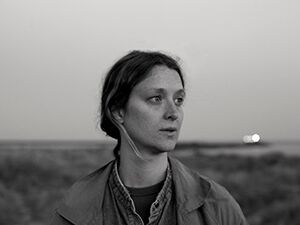
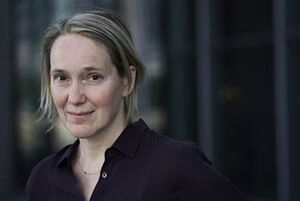

Ulu Braun (1976, Germany) lives and works in Berlin. Between 1996-2005 he studied film and visual arts at the University for applied Arts in Vienna, Academy of Fine Arts Helsinki and Film University Babelsberg. Since 1999 he has been exploring the field between cinema and the visual arts and has significantly influenced and developed the genres of video collage and hybrid film. His works are regularly shown at film festivals and art institutions.
His film "Das Glitzern im Barbieblut"/ "Glittering Barbieblood" (2021) is currently nominated for the German Short Film Awards.
Find his website here.

Sarah Szczesny, born in Starnberg, lives and works in Cologne.Sarah Szczesny studied at the Düsseldorf Art Academy and graduated as a master student from Prof. Rosemarie Trockel. Szczeny’s method of dissecting, distorting and separating images, such as cartoon film elements, characterizes her collage, painting and video work. She examines the conditions of painting by stretching the medium’s boundaries through experimental interventions – for example by using gif and loop techniques as well as sound effects -, a multidimensionality is created that gives the painting character of movement and thus locates it in the tradition of cartoons. In this process of animation of collages, which is so essential for her work, Szczesny combines formal studies and citations of pop culture and art history.
Sarah Szczesny is Villa Aurora Fellow of KunstSalon Köln.
Sarah's latest work can be found here.




